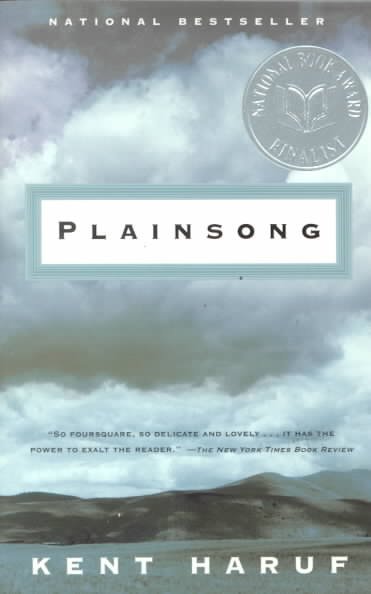Whew folks, the struggle has been real in writing this blog. I recently finished reading both Kent Haruf’s national bestseller from 1999, Plainsong, as well as C.S. Lewis’ highly acclaimed The Great Divorce. The source of my struggle most likely stemmed from the diverse nature of these two works. Yet, I felt a connection that I was loathe to discard, even as I stared at my computer screen in frustration.
 I began with Plainsong, which had been on my reading list for quite a while. It was one of the first recommendations I was given by a co-worker upon beginning this grand adventure in the world of Lemuria. It took me a bit to get pulled in, about 100 pages, which surprised me a bit; but it was worth it. The prose is leisurely and unassuming, particularly at first, while sneaking in gut-punch worthy content. Haruf unfolds the interconnected lives of a pregnant high school girl cast out by her mother, a teacher shut out by his depressed wife and their two sons, and two irresistibly lovable old crusty bachelor farmers. Each chapter follows a different character, eventually interconnecting their lives.
I began with Plainsong, which had been on my reading list for quite a while. It was one of the first recommendations I was given by a co-worker upon beginning this grand adventure in the world of Lemuria. It took me a bit to get pulled in, about 100 pages, which surprised me a bit; but it was worth it. The prose is leisurely and unassuming, particularly at first, while sneaking in gut-punch worthy content. Haruf unfolds the interconnected lives of a pregnant high school girl cast out by her mother, a teacher shut out by his depressed wife and their two sons, and two irresistibly lovable old crusty bachelor farmers. Each chapter follows a different character, eventually interconnecting their lives.
Once I became invested in the characters lives, I didn’t want to put it down. I wanted, needed, to know what decisions they would make; would they each decide to embrace the loving, yet imperfect relationships in their community (granted some of the relationship decisions made are questionable in their moral health)?
Haruf displays the inherent need and beauty found in community. It is in community that needs can be known and met, and love can be extended to the lonely. While demonstrating the importance of community, Haruf also vividly displays the often excruciatingly painful nature of solitude. Plainsong can be a rough read in its vivid detailing of what the morally unchecked individual is capable of.
I enjoyed the read, but I struggled throughout with an overarching feeling of emptiness. The various troubles of the characters are mostly concluded by the end of the novel, or with as much resolution as can be found in this life. Resolution is arrived at through relationships in community, which resonates as a true thing, but there was an emptiness in the conclusion that left me feeling, well, empty.
 As soon as I closed Plainsong, I began to delve into C.S. Lewis’ classic, The Great Divorce. The novel follows a writer as he travels between heaven and hell, all while in a dream. Upon reaching heaven, the narrator witnesses several interactions between the visiting ghosts [of which he is one], with the glowing spirits who dwell there. Each interaction consists of a spirit imploring a ghost to repent and release the things and ideas that they so desperately cling to, in order to remain in heaven. Almost unanimously, each ghost clings to their unique struggle with sin as well as their justifications in doing so, and returns to hell.
As soon as I closed Plainsong, I began to delve into C.S. Lewis’ classic, The Great Divorce. The novel follows a writer as he travels between heaven and hell, all while in a dream. Upon reaching heaven, the narrator witnesses several interactions between the visiting ghosts [of which he is one], with the glowing spirits who dwell there. Each interaction consists of a spirit imploring a ghost to repent and release the things and ideas that they so desperately cling to, in order to remain in heaven. Almost unanimously, each ghost clings to their unique struggle with sin as well as their justifications in doing so, and returns to hell.
As a reader, it was frustrating to watch each ‘ghost’ hold onto their emptiness, anger, and justification and flee back to hell. It was frustrating, yet also convicting as I know I do the same on a daily basis. It was here that the emptiness of Plainsong resonated with meaning. Community on this earth is not the end. It falls far short of what community will be like in heaven. We are currently divorced from what community and this life were created to be by sin. We are only experiencing a shadow of what is to come. What comfort there is in that knowledge!
Clearly these are my undisguised personal beliefs and introspection from my reading; you may do with them as you wish. I can heartily recommend both novels to those of similar and varying opinions and beliefs as myself. And the beauty of our uniqueness as individuals is that each of you will find your own things to ruminate on as you go about your day.


Comments are closed.